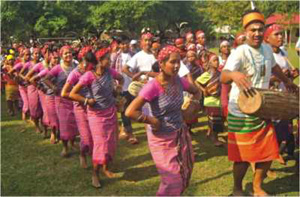 Dancing and singing, hundreds of jubilant Garos yesterday celebrated the conclusion of their two-day long Wanna (harvest) festival at Askipara of frontier Haluaghat upazila of Mymensingh.
Dancing and singing, hundreds of jubilant Garos yesterday celebrated the conclusion of their two-day long Wanna (harvest) festival at Askipara of frontier Haluaghat upazila of Mymensingh.
Wanna, one of the greatest Garo festivals, marks the beginning of the harvesting season. This festival is the ninth of its kind.
On Thursday evening, William Hanna, ambassador, Head of Delegation, European Union, inaugurated the festival celebration.
Sanjib Drong, the convener of the celebration committee presided over the inaugural session.
The indigenous Garo people from Haluaghat and Dhubaura of Mymensingh and Madhupur of Tangail district attended the celebration with their cultural teams.
Some 10 cultural teams with 300 artistes, donned in traditional multi-coloured clothing and beating traditional musical instruments, celebrated the concluding day.
The indigenous artistes used indigenous musical instruments like kakawa, nangglist, rangkilding and rangbong to accompany choruses and dance sequences. The dance sequences portrayed different agricultural activities such as preparing land and sowing seeds.
The festival is organised to satisfy Meenma, the mother of crops and monsoon, said Sanjib Drong, convener of the celebration committee, at the conclusion of the festival.
The celebration is not only for enjoyment, it also has spiritual and social importance, he added.
The Garo people are deprived of their basic rights in many cases, he said, adding that they want respect from the community at large and the state for their cultural difference.
Talking to this correspondent, eminent drama artiste Mamunur Rashid, also present at the festival, said that indigenous people are termed as ‘small ethnic groups’, which is regrettable.
The indigenous people have their own culture and way of life and we should allow them to flourish their culture and tradition and live their life accordingly, he opined.
The celebration was very colourful and beautiful, said William Hanna, adding that indigenous people all over the world celebrate such programmes in their own style and such celebrations have been continuing for centuries enriching the culture of regions and countries.
The festival was rounded up with a ‘mandi chorus’ — Harereray, Hareraray — which means to offer thanks to the creator for a good harvest.
Joyram Drong and Chhittaranjan Drong, as priests, conducted the religious rituals marking the celebration.
Courtesy of The Daily Star




















